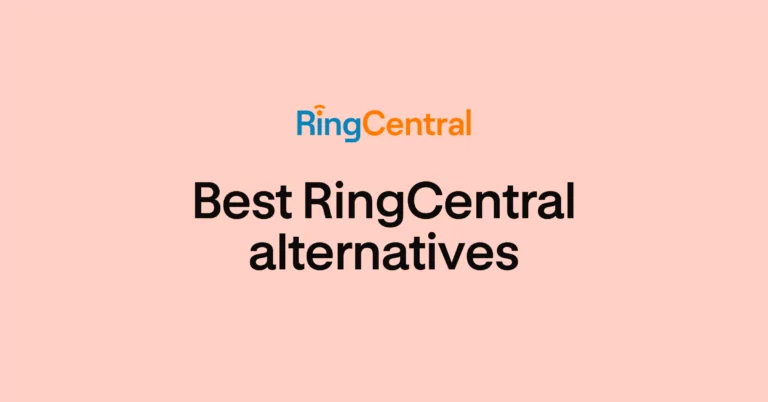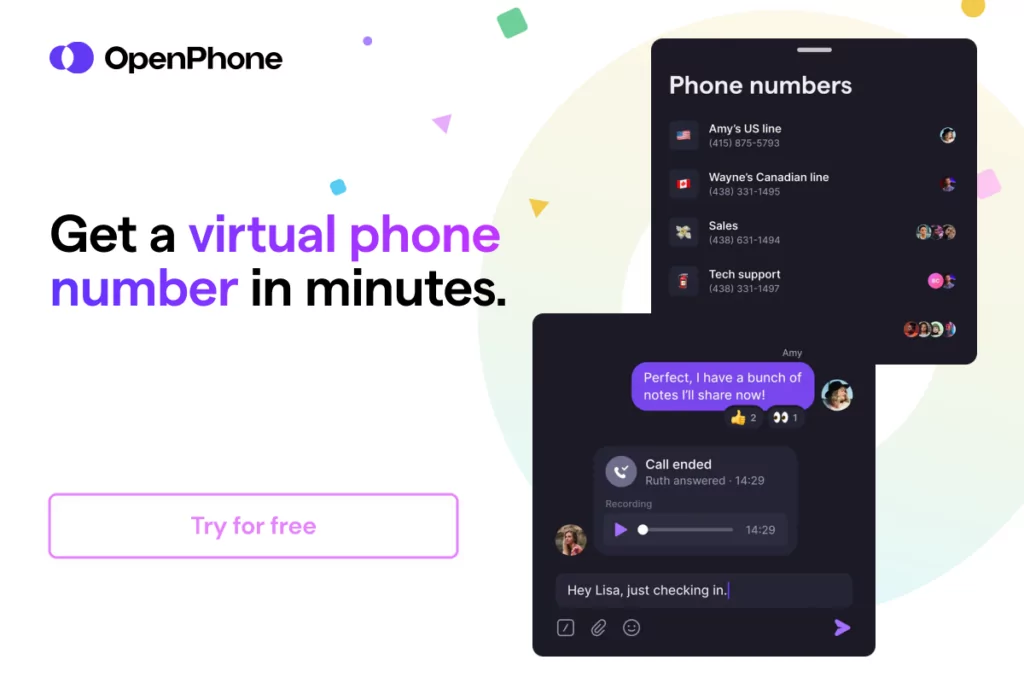Are you thinking of using RingCentral as a phone solution but weighing your options? Or are you a current RingCentral customer and ready to move on?
In this article, we’ll share some of the popular RingCentral alternatives. But first, let’s look at some of the most common reasons businesses move on from RingCentral.
Why most businesses go with RingCentral alternatives
RingCentral supports many must-have cloud-based phone system features. The platform is optimized for professional use, from basic call management and text messaging to an AI contact center add-on that helps teams provide customer support.
However, this legacy phone solution isn’t the best option for growing teams.
Here’s why RingCentral isn’t suited for most businesses:
1. RingCentral pricing adds up
RingCentral is on the pricier side when it comes to business phone systems.
Here’s a breakdown:
- Core: $20 per user per month; unlimited calls in the US and Canada, business SMS
- Advanced: $25 per user per month to access video meetings with voicemail transcriptions, automatic call recording, and CRM integrations
- Ultra: $35 per user per month to unlock additional storage and device analytics
Keep in mind RingCentral has separate plans for contact centers, AI-based sales coaching, and video meetings.
2. Texting creates bottlenecks instead of solutions
With RingCentral, your team can’t share responsibility for incoming text messages from a shared number. This delays your ability to quickly answer customers’ questions and address their concerns.
You’ll also have a set amount of business SMS/MMS messages per user.
In the US, your monthly limit is:
- Core: 25 texts per user
- Advanced: 100 texts per user
- Ultra: 200 texts per user
Expect to pay extra if you exceed your plan’s limit (which applies to both inbound and outbound messages). You could try to offset the costs by prepaying for text message bundles, which cost an unspecified amount after you sign up.
3. User experience falls short
RingCentral launched 25 years ago, and it’s kept the user interface and aesthetic of early 2000s web products.
User reviews say it’s clunky and hard to use. Which means you may end up wasting money on a service nobody uses.

4. Shared numbers are limited
With RingCentral, you can’t tell when someone else is sending a text message or is on an active call, which means you may accidentally reach out to the same client twice.
Some of RingCentral’s best alternatives — like OpenPhone — allow you to see when a colleague is viewing a conversation, typing, or on a call.
This allows you to manage a shared phone number inbox as a team.
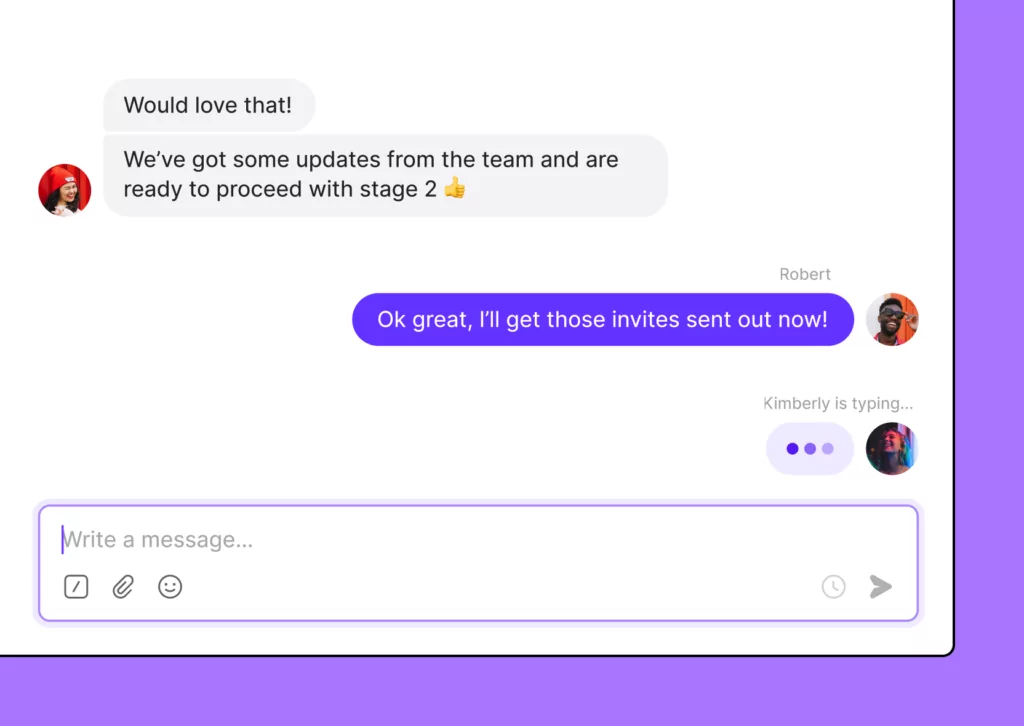
5. Best features are locked behind expensive plans
Critical features like CRM integrations, real-time analytics, and unlimited file storage (if you plan on recording calls with RingCentral) are locked behind RingCentral’s higher-tier price plans.
If you want to integrate Salesforce, HubSpot, or another CRM with RingCentral, you’ll have to sign up for the Advanced plan (which starts at $25 per user per month).
6. Unresponsive support compared to RingCentral alternatives
Due to its size, RingCentral’s customer support team can’t effectively support all its customers. Public reviews say it can take days to get a response from the support team.
Here’s an example of how some customers feel about RingCentral’s support:

Still have questions? Find out more about how RingCentral works (and if it will work for your business).
What are the best RingCentral alternatives?
Many RingCentral alternatives offer more features at lower costs. Here are ten service providers better suited for growing businesses:
- OpenPhone: Best RingCentral alternative for small businesses
- Ooma: Best RingCentral alternative for overhead paging support
- Dialpad: Best RingCentral alternative for AI workflows
- Grasshopper: Best RingCentral alternative for multi-digit phone extensions
- Nextiva: Best RingCentral alternative for conversational analytics
- Phone.com: Best RingCentral alternative for HIPAA compliance
- Google Voice: Best RingCentral alternative for Google Workspace users
- Zoom Phone: Best RingCentral alternative with international numbers
- GoTo Connect: Best RingCentral alternative for contact centers
- Vonage: Best RingCentral alternative for desk phones
Here’s how each of these providers compare at a glance:
| Provider | Starting price | Unlimited calling to US & Canada | SMS/MMS to US & Canada | Shared phone numbers | Additional phone numbers |
|---|---|---|---|---|---|
| RingCentral | $20 per user per month | ✓ | 25 messages per user per month | ✓ | $4.99 per number per month |
| OpenPhone | $15 per user per month | ✓ | ✓ | ✓ | $5 per number per month |
| Ooma | $19.95 per user per month | ✓ | Requires upgrade | ✓ | $9.95 per number per month |
| Dialpad | $25 per user per month | ✓ | For US & Canadian customers only | ✓ | Requires upgrade |
| Grasshopper | $14 per month | ✓ | Local numbers only | X | $9 per number per month |
| Nextiva | $18.95 per user per month | ✓ | Requires upgrade | ✓ | Contact for a quote |
| Phone.com | $12.74 per user per month | Requires upgrade | ✓ | $5 per month | $4.99 per number per month |
| Google Voice | $16 per user per month (must have Google Workspace) | Unlimited calls to Canada from the US only | US customers only | Requires upgrade (ring groups only) | X |
| Zoom Phone | $10 per user per month | X | US & Canadian numbers only | $250 per user per year | $5 per number per month |
| GoTo Connect | Contact for a quote | X | For US & Canadian customers only | ✓ (up to 8 phones) | Contact for a quote |
| Vonage | $13.99 per user per month (1-year contract) | ✓ | Local US and Canadian numbers only | Requires upgrade or $4.99 add-on for each call group | $14.99 per number per month |
1. OpenPhone: Best RingCentral alternative for small businesses

OpenPhone is a business phone system built specifically for growing teams. Our VoIP phone platform offers the same features as RingCentral but with a modern user experience and better price. Plus, you don’t have to worry about having to upgrade due to running into call recording storage limits or needing to send more than 25 text messages per month.
While both RingCentral and OpenPhone offer shared lines for incoming calls, OpenPhone lets your team field incoming texts together. This cuts down on your service response time and gives customers the level of service they deserve.
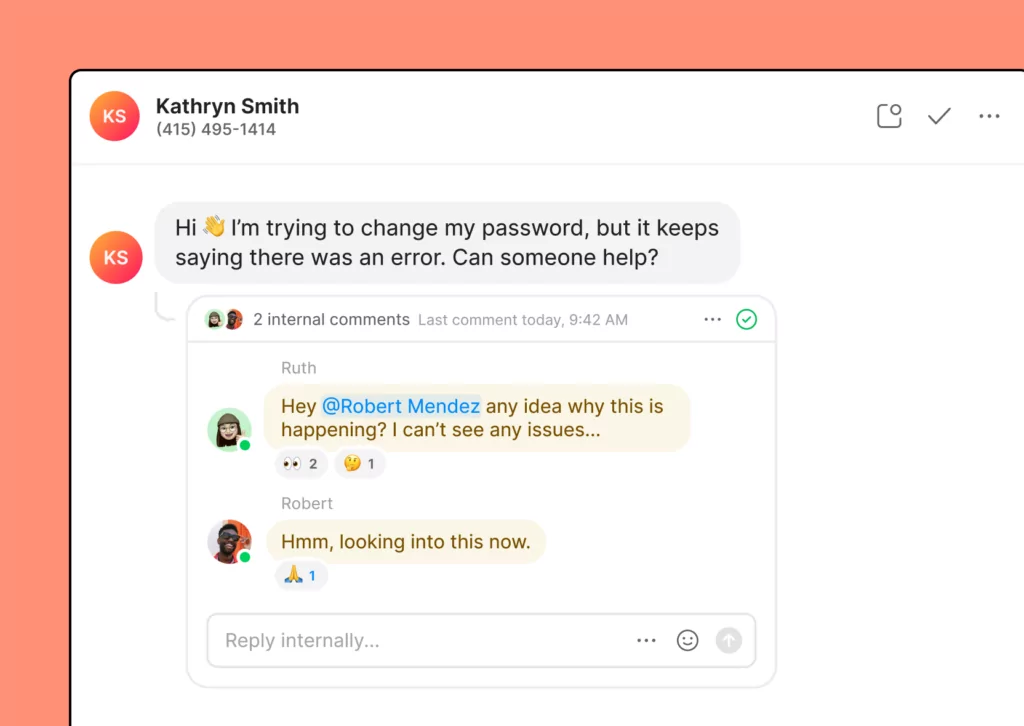
Your team can easily collaborate on any text messages or customer follow ups with internal threads. These comments are only visible to your team and let you easily loop in colleagues and assign tasks.
Here are a few other ways OpenPhone users streamline their communication workflows:
- Business hour settings
- Crystal-clear audio quality
- Conditional call forwarding and call routing
- Browser-based and desktop apps
- Toll-free, Canada, and US numbers
- Multiple phone numbers tied to one account
- Shared phone numbers for customer support
- Lower international call and text rates compared to traditional providers
How to get a virtual number with OpenPhone
Getting a new phone number from almost anywhere in the world is a simple process when you choose OpenPhone as your virtual phone number provider. Follow these three steps:
- Create an account with OpenPhone (when you sign up, you get a free, seven-day trial).
- During signup, choose your city or area code in the US to select your preferred phone number.
- Once the signup process is complete, you’re all set to use your new virtual phone number!
Why OpenPhone wins over RingCentral
- Collaborative shared numbers
- More competitive pricing
- Unlimited SMS messages and toll-free minutes in the US and Canada
OpenPhone pricing
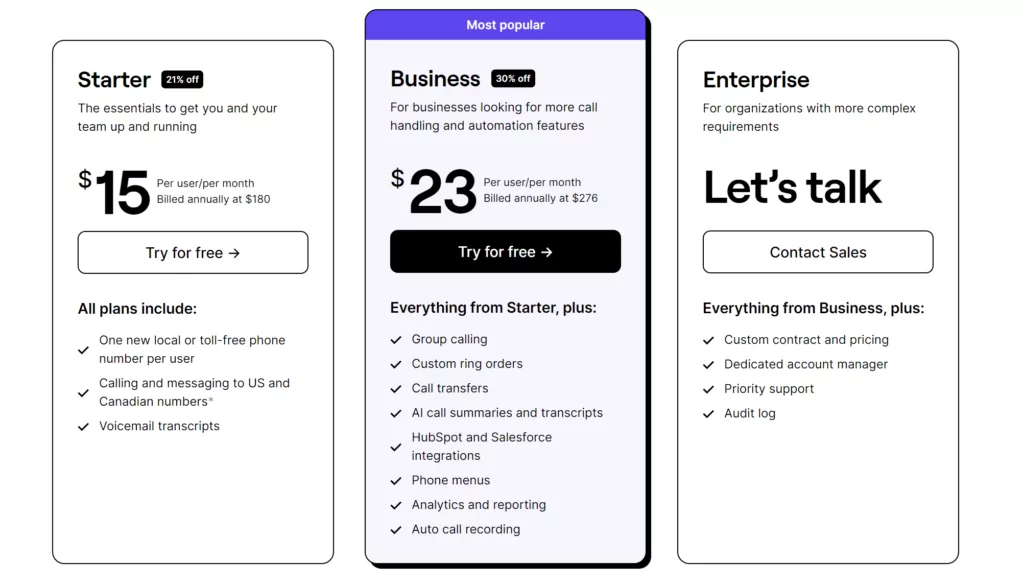
If you’re looking for a company with cost-efficient and transparent rates, OpenPhone offers three business-friendly pricing tiers with no annual contracts required:
- Starter: $15 per user per month to access shared numbers with up to 10 teammates, auto-attendants, scheduled texts, and more
- Business: $23 per user per month to unlock call transfers, logs and analytics, HubSpot CRM integration, unlimited teammates on a shared number, and more
- Enterprise: Custom pricing for a dedicated account manager and more
See why thousands of businesses use OpenPhone by signing up for a free, seven-day trial.
2. Ooma: Best RingCentral alternative for overhead paging support
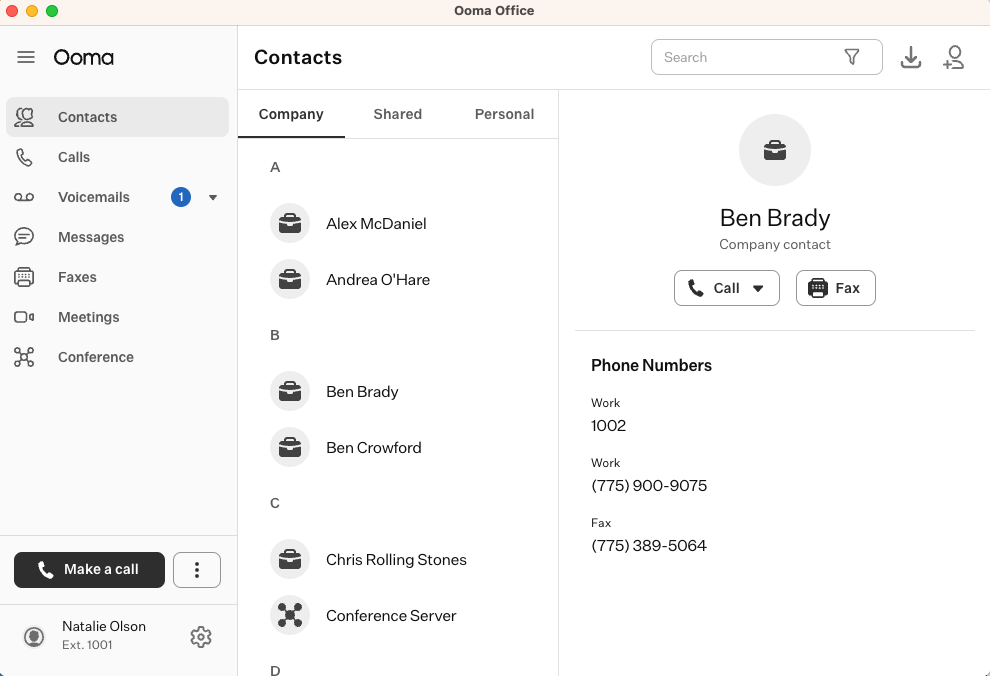
Ooma is another RingCentral alternative that lets you manage calls through US local or toll-free numbers. With its affordable low-tier plan, you can access a mobile app with an auto-attendant (IVR), virtual faxing, and an overhead paging or public address (PA) system.
You can access these features for less than the cost of RingCentral’s most basic plan:
- Ring groups
- Call forwarding
- Voicemail
Unfortunately, Ooma’s cost-effective plans — which are still far pricier than OpenPhone — come at the cost of useful features. The base plan doesn’t offer texting or call recording at all. You also have to upgrade if you want to call and text using Ooma’s desktop app.
Why Ooma wins over RingCentral
- Better features for physical offices (overhead paging support)
- Unlimited calling outside the US (Puerto Rico, Mexico, and Canada)
Ooma pricing

- Essentials: $19.95 per user per month for 50 standard phone features, virtual receptionist, mobile app, and music on hold
- Pro: $24.95 per user per month to unlock text messaging, video conferencing, Ooma’s desktop app, call recording, and analytics
- Pro Plus: $29.95 per user per month to access the Salesforce integration, hot desking, call queuing, and advanced call management
Learn more about how Ooma compares in the Ooma vs RingCentral guide.
3. Dialpad: Best RingCentral alternative for AI workflows

Dialpad is a newer business phone solution offering AI features like natural language processing, semantic search, automated speech recognition, and more.
The base phone plan (AI Voice) gives you access to some features only available on higher-tier plans on RingCentral, such as:
- Call recording
- Analytics and reporting
- Google Workspace or Microsoft 365 integrations
Just keep in mind most of Dialpad’s best features are locked behind other plans. You may have to mix and match your options to get the right features for your business.
Why Dialpad wins over RingCentral
- Cheaper plans
- Lots of AI features
Learn more in our guide comparing Dialpad vs RingCentral.
Dialpad pricing

Dialpad offers four business communications plans, but only three of them come with outbound calls:
- AI Meetings: $15 per user per month for unlimited video meetings
- AI Voice: $25 per user per month to unlock calling, messaging, and AI features (minimum three users)
- AI Sales: $95 per user per month to unlock tier 2 support, optional add-on for Ai CSAT, and optional add-on for AI scorecards
- AI Contact Center: $115 per user per month to unlock IVR, ACD, and call whispering
4. Grasshopper: Best RingCentral alternative for multi-digit phone extensions
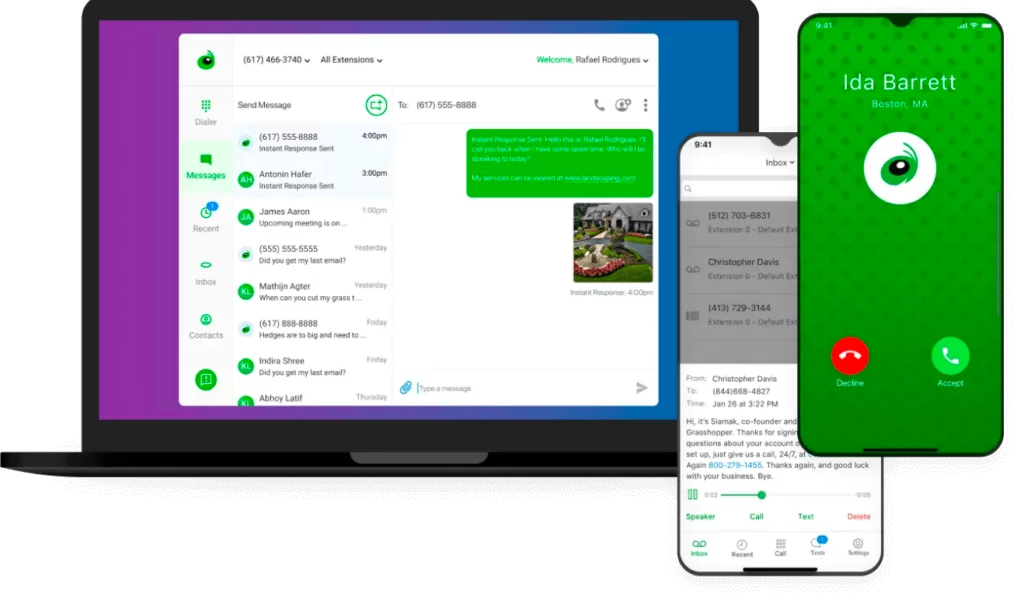
Grasshopper is a VoIP provider serving small teams and solopreneurs.
It offers several features you can’t get with a base RingCentral plan:
- Phone number extensions (upgrade required on RingCentral)
- Unlimited SMS (unavailable on RingCentral)
- Auto-replies (unavailable on RingCentral)
But Grasshopper’s platform and user experience are outdated at best. And it lacks many modern business phone features like shared phone numbers, call recording, and integrations.
If you can get past the clunky interface, you can get solid features as a solopreneur.
Why Grasshopper wins over RingCentral
- Lower-cost plans
- Suitable for solopreneurs
Learn more in our guide comparing Grasshopper vs RingCentral.
Grasshopper pricing

- True Solo: $14 per month for one user, one phone number, and one extension
- Solo Plus: $25 per month for unlimited users, one number, and three extensions
- Small Business: $55 per month for unlimited users, four numbers, and unlimited extensions
5. Nextiva: Best RingCentral alternative for conversational analytics
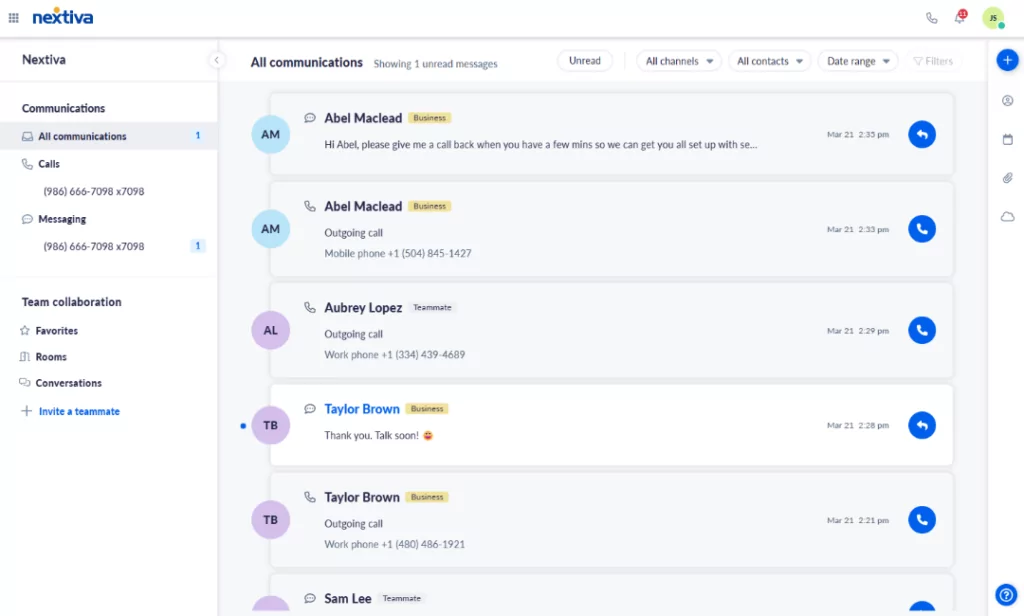
Nextiva offers essential features like unlimited calling in the US and Canada. The starter plan also comes with conversational analytics — something RingCentral requires an upgrade to access.
With decent basic features, Nextiva is a solid alternative to RingCentral:
- Threaded conversations
- Call log reports
- Apps for mobile and desktop
However, Nextiva’s base plan is missing key features like SMS/MMS support and voicemail transcriptions. If you don’t need to text or send images to customers, this isn’t a bad alternative.
Why Nextiva wins over RingCentral
- Conversational analytics on the base plan
- More toll-free minutes (1,500 minutes vs. RingCentral’s 100 minutes)
Nextiva pricing

- Essential: $18.95 per user per month for unlimited internet fax, auto-attendant, and 24/7 support
- Professional: $22.95 per user per month to unlock SMS/MMS, CRM integrations, and voicemail transcriptions
- Enterprise: $32.95 per user per month to unlock unlimited call recording, unlimited video meetings, and Microsoft Teams integration
Learn more about how these two platforms stack up in our RingCentral vs Nextiva guide.
6. Phone.com: Best RingCentral alternative for HIPAA compliance

Phone.com is a HIPAA compliant VoIP system with a user-friendly interface. With the mid-tier plan, medical-related businesses that handle patient medical records can discuss patients’ health-related issues by phone.
You’ll also get several features that RingCentral’s Core plan lacks:
- Call analytics
- CRM integrations
- Advanced video conferencing features (like live streaming)
However, many people say Phone.com has a confusing user interface. Their customer support isn’t rated highly either.
Just know you may be taking a gamble whenever you need to troubleshoot your service. You can also run into hidden fees if you use their base plan, as it only includes 500 call minutes and 1,000 text segments per month.
Why Phone.com wins over RingCentral
- HIPAA compliance
- Analytics on the base plan
Phone.com pricing
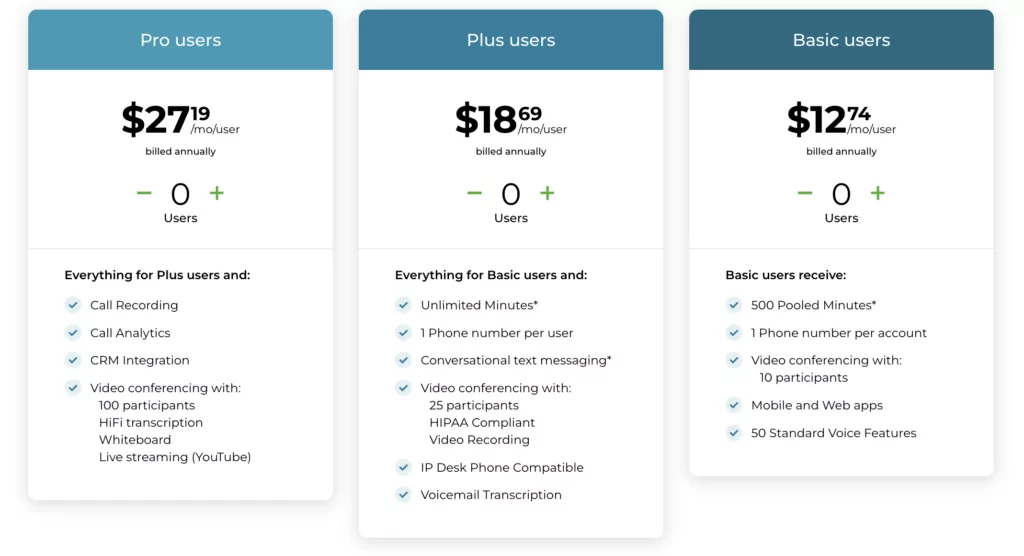
- Basic users: $12.74 per user per month for 500 pooled call minutes (shared between users), 1,000 pooled text segments, and one phone number per account
- Plus users: $18.69 per user per month to unlock unlimited minutes, one phone number per user, video conferencing, and conversational text messaging
- Pro users: $27.19 per user per month to unlock call recording, analytics, CRM integrations, and enhanced video conferencing for 100 participants
Discover how these two platforms stack up in our Phone.com vs RingCentral guide.
7. Google Voice: Best RingCentral alternative for Google Workspace users
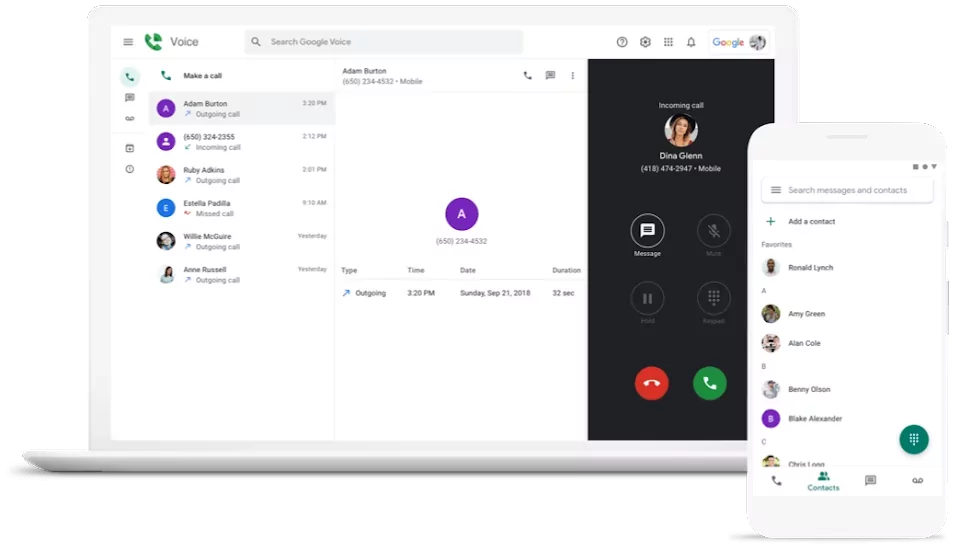
Google Voice’s platform is a solid option for users who already have a Google Workspace account. It comes with nearly all the basic features, including:
- Unlimited calling
- Voicemail to text
- Call recording
Unfortunately, Google Voice is missing a few options that many businesses need. For instance, it lacks toll-free phone numbers and auto-replies.
And remember: Google Voice’s free plan wasn’t meant for business use. You won’t get essential business features like call recording, phone menus, and ring groups.
Why Google Voice wins over RingCentral
- Accessible for those with Google Workspace accounts
- Free plan for personal users
Google Voice pricing

If you’re still interested in using Google Voice for your business, choose from one of these three plans:
- Starter: $10 per user per month for access for up to 10 team members
- Standard: $20 per user per month to unlock ring groups, multi-level auto attendants, and unlimited users
- Premier: $30 per user per month to unlock advanced reporting
Don’t forget to budget at least $6 per user per month for Google Workspace.
You can read more about Google Voice vs RingCentral in our guide.
8. Zoom Phone: Best RingCentral alternative with international numbers
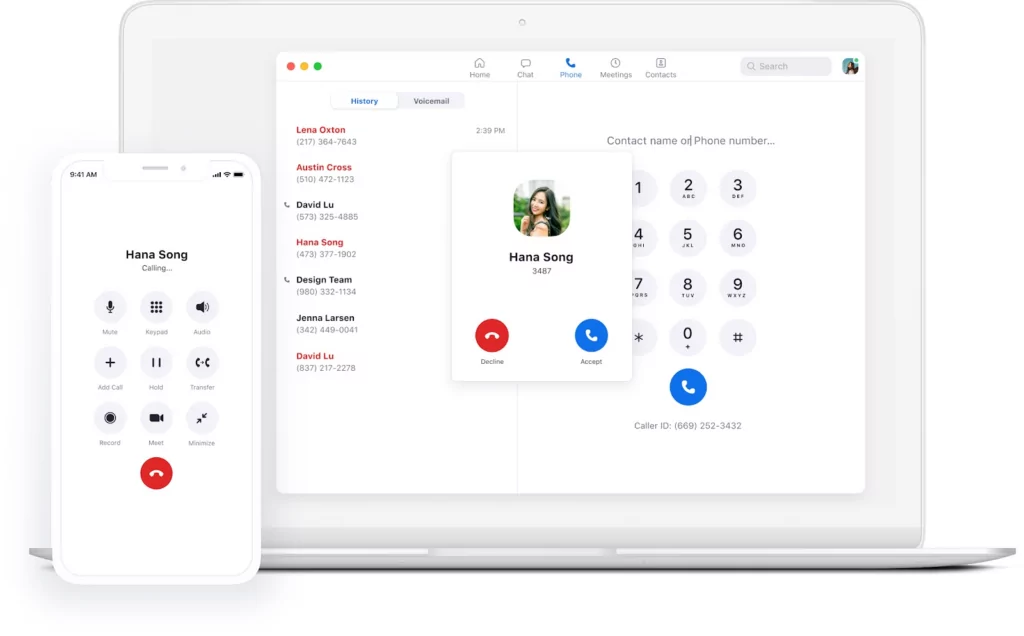
Zoom Phone comes with all sorts of features in its business phone plans, including voicemail transcription, unlimited auto attendants, and call recording. The most expensive plan offers one business number in an international location, which means non-US customers can still get a local number.
You’ll also access features that only come with an upgrade on RingCentral:
- Hot desking
- Automatic call recording
- CRM integration
However, one of Zoom Phone’s shortcomings is that you have to pay extra to get the benefits Zoom is known for: video conferencing.
If Zoom Phone doesn’t hit the mark — and you don’t want to pay more for Zoom One — there are other options out there to make your communication easier and more efficient.
Why Zoom Phone wins over RingCentral
- International numbers
- More features that don’t require an upgrade
Zoom Phone pricing

If you need only the ability to call and text, you can choose one of these options:
- Metered: $10 per user per month for metered outbound calling, phone extension numbers, and SMS and MMS support (for US and Canadian numbers only)
- Unlimited: $15 per user per month to unlock unlimited outbound calling and an optional add-on for international calls in 19 countries
- Select:$20 per user per month to unlock unlimited domestic calling in one of Zoom’s supported 40+ countries
- Pro: Custom quote to unlock call recording, internal calling, and iOS and Android apps
If you want Zoom video conferences and calls and texting, plan on upgrading to a Zoom One plan:
- Business Plus: $22.49 per user per month for 300 attendees per meeting, 10 GB of cloud storage, and unlimited regional phone calls (comes with SMS and MMS, call queuing, and ACD)
- Enterprise: Contact for custom price to unlock 1,000 attendees per meeting, unlimited cloud storage, and PBX phone features (includes metered outbound calls and IVR but does not come with text support)
9. GoTo Connect: Best RingCentral alternative for contact centers
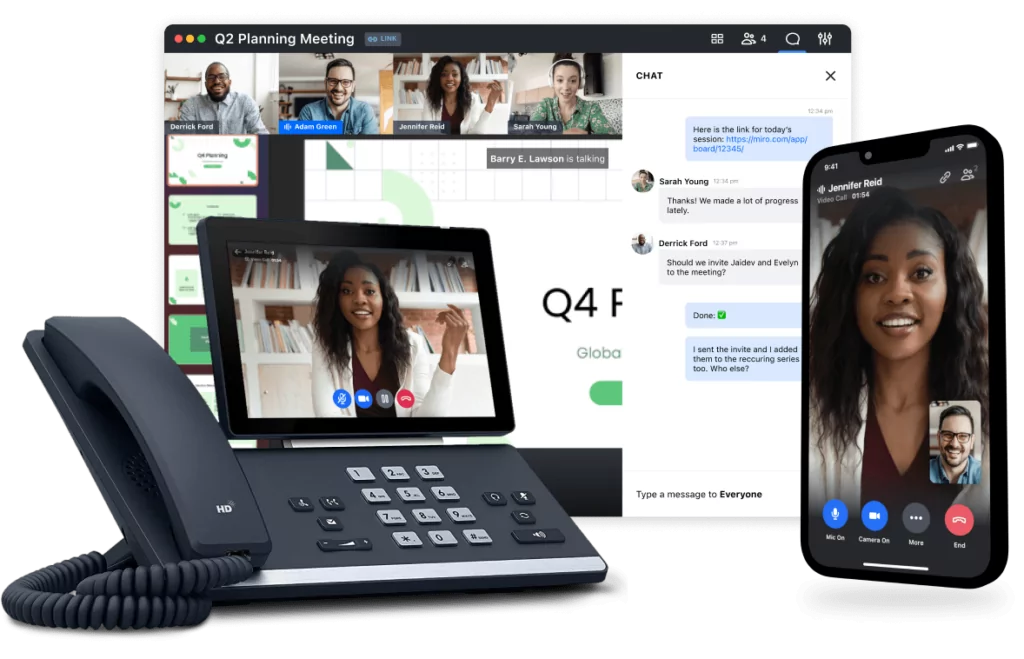
GoTo Connect is a RingCentral alternative that supports video conferencing and real-time predictive analytics. Many of its features were designed specifically for call centers, including call dispositions and InRoom Links.
But this phone service provider has staunch limitations that lead many businesses to GoTo Connect alternatives. The worst of them include:
- Pooled toll-free minutes (just 1,000 minutes per month shared between users)
- A limit of 250 video meeting participants, no matter how much you upgrade
- Only 80 SMS credits per user per month
- No shared numbers without upgrading
Plus, GoTo Connect no longer has public pricing. The only way to get a quote is to contact them directly.
Why GoTo Connect wins over RingCentral
- More SMS credits and toll-free minutes than RingCentral
- 10x the number of toll-free minutes
GoTo Connect pricing

GoTo Connect doesn’t publicly list its pricing. If you want a quote, you need to get in touch with their sales team.
10. Vonage: Best RingCentral alternative for desk phones

Like RingCentral, Vonage offers pretty basic features on each plan, including:
- A mobile and desktop app
- Unlimited domestic calling and SMS
- Virtual receptionists
But beware: while Vonage for Business does let you connect to a desk phone, it also hides a lot of extra costs, like requiring you to upgrade to access voicemail transcriptions. Also, if you want your team to share responsibility for taking incoming calls, simultaneous ring is only available on their highest-tier plan.
You also have to upgrade to the second-most expensive plan just to unlock desk phone support.
Why Vonage wins over RingCentral
- Unlimited calling and SMS support
- Unlimited toll-free minutes
Vonage pricing

Vonage has three primary subscription plans to choose from (but keep in mind there may be hidden fees within each one).
Here’s how much you’ll pay if you have a team of four users or less:
- Mobile: $13.99 per line per month for voicemail, virtual receptionists, and desktop and mobile apps
- Premium: $20.99 per line per month to access team messaging, desk phone support, and CRM integrations (HubSpot, Microsoft Dynamics, Salesforce, etc.)
- Advanced: $27.99 per line per month to access call recording (15 hours max), voicemail transcriptions, and simultaneous ring
Check out our guide on Vonage vs RingCentral for more info on how these two providers compare.
How we ranked RingCentral alternatives
We ranked the best RingCentral alternatives using a two-part methodology.
First, we researched each provider’s basic features. Then, we examined unbiased user reviews.
We then personally tested each platform to evaluate:
- Reliability: System issues like downtime can hurt your reputation. Over time, it leads to lost customers and directly impacts your top line.
- Value for money: How much does the VoIP system return for each dollar invested? Does it save you enough money by reducing costs or offering better functionality?
- Budget: Low pricing shouldn’t be the most important thing on your list, but you should still avoid hidden fees and excessive costs.
- Third-party integrations: We checked for tools commonly used in growing the team’s tech stacks. Business phone integrations can simplify workflows and funnel data into a single space.
- Ease of use: Complex systems are a recipe for low buy-in and increased spending on training the staff. The result could be a lower ROI.
- Customer support: Is customer support easy to reach? They should be able to offer quick solutions when you need them most.
What to look for in a RingCentral alternative
Struggling to choose the right RingCentral competitor?
You should make a decision by starting with these factors:
1. Collaboration features
The right cloud phone system should serve all your communication needs, including chatting with your coworkers without switching applications.
Be sure your RingCentral alternative comes with usable collaboration tools, including threads, mentions, direct texting, and more. The best phone services will give your team the visibility needed so you’re not duplicating any work.
For example, OpenPhone lets you easily see when a teammate is actively replying to a contact over text.
2. Business and communication tools
Great customer experiences should be prompt, professional, and positive. Your VoIP service should take more work off your plate by letting you set up auto-replies and Zapier workflows.
3. Scalability and cost
You should be able to upgrade your communication solution whenever you’re ready — and not a minute before. If a provider locks essential features behind higher tiers to ‘force’ you to upgrade, you may want to consider another alternative.
4. Ease of use
A steep learning curve can cost you time, money, and effort to get your team up and running. But with an intuitive business phone system, this won’t be an issue.
5. Integrations with your existing tech stack

The last thing you need is yet another siloed collaboration tool — and you shouldn’t have to pay extra for essential integrations. The best RingCentral alternatives come with the basic connections your business needs and then let you unlock more as you grow.
OpenPhone: The best RingCentral alternative

If you’re looking for a RingCentral alternative, look no further than OpenPhone.
With OpenPhone, you can upgrade your business communications by making it easier than ever to build relationships with your customers. This means you can access your calls, texts, and team messages in one easy-to-navigate app. Plus, you’ll enjoy all the features your business needs at a low cost — without hidden fees.
Ready to make the switch? Start a free trial of OpenPhone today.
FAQs
RingCentral is a legacy communication platform that’s been in business since 1999. It offers basic calling and texting features to small business owners, although many of its limitations frustrate growing brands.
RingCentral’s Core plan starts at $20 per user per month. If you want more features, you’ll have to upgrade to the Advanced plan ($25 per user per month). The Ultra plan ($35 per user per month) unlocks all available features.
Reviewers on TrustPilot like using RingCentral’s unified communications stack, including their VoIP phone calls, text messages, and video meetings. They also appreciate having desk phone support in office locations with older phone equipment.
Personal users can get a free Google Voice account to make calls and texts in the US and Canada. However, if you’re looking for business phone features or need video call support, you’ll have to look for a RingCentral alternative.
OpenPhone is the #1 alternative to RingCentral as rated by G2. Our virtual phone system lets you connect with customers from anywhere in the world with an internet connection.
One look at G2 explains everything you should know. RingCentral has 4/5 stars from 131 reviewers. On the other hand, OpenPhone has 4.7/5 stars from 1,751 reviewers.
Not if you’re trying to save money. Dialpad’s base plan costs $25 per user per month, and you may need to mix and match plans to get the features you need.
Nextiva’s base plan is slightly cheaper than RingCentral’s. However, you’ll lose access to essential business features like SMS/MMS.
You can use Zoom Phone to get an international phone number, which is something RingCentral doesn’t provide. However, you’ll only have access to limited integrations and can’t get unlimited domestic calling unless you upgrade.
You can follow these steps to port a number from RingCentral to OpenPhone:
1. Sign up for an OpenPhone account.
2. Use the OpenPhone app to submit your porting request.
3. Export your RingCentral contacts and import them into OpenPhone so business customers don’t fall through the cracks.
